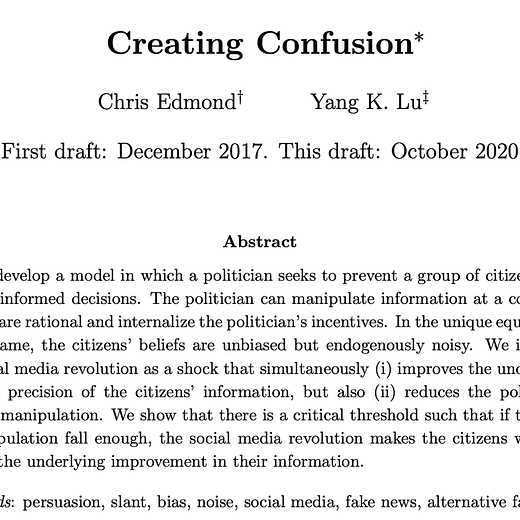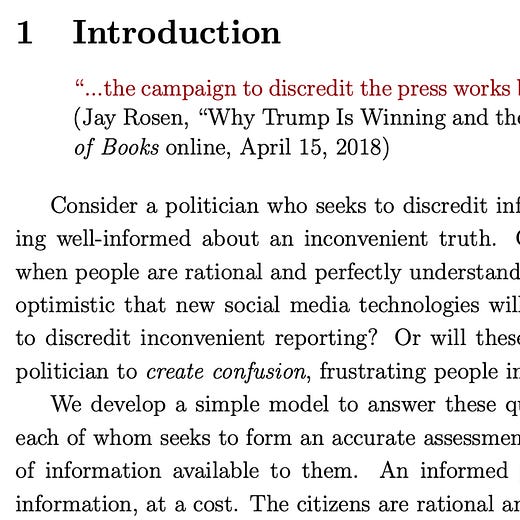Best of #econtwitter - Week of November 8, 2020
Nov 09, 2020
Welcome readers old and new to this week’s edition of the Best of Econtwitter. Thanks to those sharing suggestions, over email or on Twitter @just_economics.
Paper summaries

Mariacristina De Nardi@M_De_Nardi
1/7 De Nardi, Fella, Knoef, Paz-Pardo, Van Ooijen (2020), forthcoming: JPubE. What drives labor market income risk? We use Dutch and U.S. data to decompose earnings changes between hours and wages and to study how the family and the government help to insure against them.
5:21 PM · Nov 2, 2020
19 Reposts · 83 Likes

Michael R. Strain@MichaelRStrain
THREAD. In my latest working paper, @dwschanz and I find that EITC expansions increase employment. On average, employment increased by about 5 percentage points by the fifth year following an EITC expansion.

3:52 PM · Nov 2, 2020
34 Reposts · 109 Likes

Amanda Glassman@glassmanamanda
#cash #nutrition - 23% decline in #stunting in #Indonesia - huge effect https://t.co/kZ8obFnWW4

Ugo Gentilini @Ugentilini
Paper alert!
Article by Cahyadi et al finds that in #Indonesia, 6 ys of PKH conditional #cashtransfers led to more childbirths using trained professionals, 23% decline in stunting, & halving of children out of school. But no impact on family jobs/assets.
https://t.co/WQmJcJjB2M https://t.co/4DsOmrg7I3
7:06 PM · Nov 5, 2020
1 Repost · 5 Likes

Creig Lamb@creiglamb
1) Big Monday for all the automation heads out there. New Stats Can study shows confirms what @dk_munro @vviet93 and myself have been saying for a while: firms automate to improve productivity, which *increases* firm-level employment
www150.statcan.gc.ca
The Employment Consequences of Robots: Firm-level Evidence
3:35 PM · Nov 2, 2020
9 Reposts · 22 Likes

Alexander Berger@albrgr
Insanely large (10pp!) effects on voter turnout in South Africa from telling people their party is polling just ahead in this @kateorkin RCT: dropbox.com/s/0gp6ora3bxao…

8:40 PM · Nov 6, 2020
12 Reposts · 51 Likes

Nozomi Nakajima@nozominaka
New @nberpubs working paper w/ wonderful coauthors @felbarrera @paul_gertler @hpatrinos
Low-cost, group-based information intervention increases parental involvement in schools, changes parenting behavior at home, and reduces disciplinary action in schools.
A thread 👇
1/N
3:28 PM · Nov 2, 2020
13 Reposts · 39 Likes

Dean Eckles@deaneckles
🎯How can we learn to target interventions when we care about outcomes that are only observed after a delay?🗓️
This comes up in settings as varied as clinical trials (5 yr all-cause mortality) and marketing (customer lifetime value).
Our new paper:
arxiv.org/abs/2010.15835

10:46 PM · Nov 2, 2020
36 Reposts · 145 Likes

Chris Edmond@chrisedmond
On the off chance you're wanting a break from US politics...
Here's a new version of "Creating Confusion" (just accepted by JET) on the politics of disinformation, joint with Yang Lu. 1/
chrisedmond.net/Edmond%20Lu%20…
[@jayrosen_nyu getting cited in economics journals now]


5:41 AM · Nov 2, 2020
16 Reposts · 64 Likes
Job market papers

Elif Bike Osun@elifbikeosun
Very cool paper by @NinaRoussille. It's not surprising to me that there is a gender ask gap in salaries, but it's very surprising that the gap can be completely eliminated by pre-filling the answer box AND that women do not face penalty for asking the same wage as men.

Jennifer Doleac @jenniferdoleac
Nina Roussille
JMP: "The central role of the ask gap in gender pay inequality"
Website: https://t.co/OinqvDgD9U https://t.co/ureaBtwjTp
4:57 PM · Nov 3, 2020
7 Reposts · 25 Likes

Dr. Peter Q. Blair@pqblair
*Check out this JMP* by @Ebehi_Iyoha of @VanderbiltEcon: "Estimating Productivity in the Presence of Spillovers:
Firm-level Evidence from the US Production Network."
Headline: new approach for estimating production spillovers in networks + empirical estimates. @ben_golub

4:44 AM · Nov 2, 2020
15 Reposts · 50 Likes

Ben Moll@ben_moll
Want to learn how to incorporate present bias into your macro model to better match empirical evidence on consumption behavior?
Check out "Present Bias in Consumption-Saving Models: A Tractable Continuous-Time Approach" by Harvard PhD student Peter Maxted scholar.harvard.edu/files/maxted/f…


Ben Moll @ben_moll
New paper "Present Bias Amplifies the Household Balance-Sheet Channels of Macroeconomic Policy" w Laibson & Maxted
https://t.co/RDaRnKQUen
Main results in title, though some more subtlety for monetary policy bc present-biased households procrastinate refinancing their mortgages https://t.co/Mbj9fDv94b
9:44 AM · Nov 7, 2020
13 Reposts · 61 Likes
Good discussion threads

Nageeb Ali@SNageebAli
Why do we vote? Our reasons often reflect a mixture of ethical considerations and social motivations, and we've seen this on #ThisEconomistVotedBecause.
If you're looking for a newsbreak, here is a tiny subset of papers to read.
(Writing this is my newsbreak).
1/15
4:20 PM · Nov 2, 2020
13 Reposts · 55 Likes

Jason Abaluck@Jabaluck
I found @EpiEllie's article thought-provoking but I fundamentally disagree with her main thesis: I think we urgently need more work by economists analyzing questions that are traditionally analyzed by epidemiologists.

Ellie Murray @EpiEllie
I’ve been waiting anxiously for my Journal of Economics Perspectives article to be available online because I wasn’t sure how people would respond.
Thank you to everyone who’s sent kind messages. They really mean a ton! 🙏🏼
https://t.co/lClFr8oIoL
2:57 AM · Nov 6, 2020
24 Reposts · 116 Likes

Jason Abaluck@Jabaluck
In a world with @NateSilver538 and @Nate_Cohn doing the analytical low-hanging fruit, it's hard to imagine that trying to eek out a slightly lower mean-squared error is a good use of time for people with sufficient capital and quantitative skills.
7:42 PM · Nov 8, 2020
^interesting thread on prediction markets and other social institutions for information aggregation
Public goods

Johannes Stroebel@stroebel_econ
For those of you working with 13(f) data, Backus, @conlon_chris and @MSinkinson have a new and public version of the data that fixes a bunch of errors in the TR/WRDS data source.
Great public good:
sites.google.com
Michael Sinkinson - Common Ownership Data

3:38 AM · Nov 5, 2020
14 Reposts · 64 Likes

